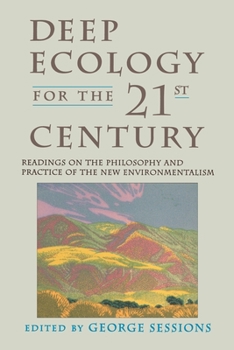Deep Ecology for the Twenty-First Century
Select Format
Select Condition 
Book Overview
Every day, in newspapers and on television, we read and hear about the ongoing destruction of the environment: the greenhouse effect, ozone layer depletion, deforestation, and air and water pollution. Deep Ecology offers a solution to the environmental crisis through a radical shift in human consciousness--a fundamental change in the way people relate with the environment. Instead of thinking of nature as a resource to be used for human needs, Deep Ecology argues that the true value of nature is intrinsic and independent of its utility. Emerging in the 1980s as an influential philosophical, social, and political movement, Deep Ecology has shaped the environmental debate among leading activists and policymakers--from former Vice-President Al Gore to Dave Forman, cofounder of Earth First Deep Ecology for the Twenty-First Century contains thirty-nine articles by the leading writers and thinkers in the filed, offering a comprehensive array of perspectives on this new approach to environmentalism, exploring: - The basic philosophy of Deep Ecology. - Its roots in the writings of Henry David Thoreau, John Muir and Rachel Carson. - The relationship of Deep Ecology to social ecology, ecofeminism, the Greens, and New Age futurism. - How Deep Ecology as a way of life is exemplified by two important environmentalists: poet Gary Snyder and Norwegian philosopher Arne Naess. - The philosophical dimensions of this environmental movement by its leading theorist. - The politics of ecological sustainability and the social and political implications of Deep Ecology for the next century.
Format:Paperback
Language:English
ISBN:1570620490
ISBN13:9781570620492
Release Date:January 1995
Publisher:Shambhala
Length:520 Pages
Weight:1.59 lbs.
Dimensions:1.4" x 6.0" x 8.9"
Customer Reviews
3 ratings
In the Beginning . . .
Published by Thriftbooks.com User , 19 years ago
The first words of this venerable and very important anthology of seminal papers in environmental ethics are these: "The Long-Range Deep Ecology movement emerged more or less spontaneously and informally as a philosophical and scientific social/political movement during the so-called Ecological revolution of the 1960's. Its main concern has been to bring about a paradigm shift - a shift in perception, values, and lifestyles - as a basis for redirecting the ecologically destructive path of modern industrial growth societies. Since the 1960's, the long-range Deep Ecology movement has been characterized philosophically by a move from anthropocentrism to ecocentrism, and by environmental activism." I cite this passage because, sadly, the international corporate hegemony, its paid political operatives, and multifarious media mouthpieces have done such a deceitfully effective job of at once clouding the real issue of our desperately precarious environmental situation and reinforcing our wholly unnecessary dependence of non-renewable energy resources to the tune of record profits, that there are many people coming of age in the most literate societies in the world, who have no idea of what Deep Ecology is, not to mention such a basic distinction as that between anthropocentrism to ecocentrism. Actually, I would say that the vast majority of the planet's population is either ignorant of this distinction or acts in feigned ignorance or ignorance-based denial of it. The idea that our ultimate nurturing and sustaining parent is the Earth, that we live on borrowed time, that our first responsibility in any sort of act is consideration of our responsibility to stewardship of this planet, is generally far from most people's minds when they do act. From radical (and radically unnecessary) clear-cut to all-too common litter, as a humanity, we obviously don't get it. The corporate think-tank seems to produce an never ending stream of ongoing rationalizations and euphemistically-coated rationales for the relentless wholesale destruction of the only home we have, and we embrace, however unwillingly in some cases, but generally unconsciously in most, the systems which enable this unremitting and mindless extirpation of the root of life to go on. Thus, a bit of re-education on the subject, the philosophical justifications for the ecocentric worldview, might be in order. I can think of no better place to start than the 39 papers in Deep Ecology for the 21st Century, which discuss this need for a shift in our thinking as a humanity in depth. The book is divided into five sections: What is Deep Ecology?; Historical Roots of Deep Ecology; Arne Naess on Deep Ecology and Ecosophy; Deep Ecology and Eco-Feminism, Social Ecology, the Greens, and the New Age; Wilderness, The Wild, and Conservation Biology; Toward the Twenty-First Century and Beyond: Social and Practical Implications. The book focuses particularly on work of Arne Naess (12 entries) and Gary Snyder (
Eye Opening
Published by Thriftbooks.com User , 22 years ago
I read this book because it was required for Session's Philosophy course at Sierra College. Those of you who can read it without experiencing Professor Sessions have a great advantage. He put together an excellent book, unfortunately he is a real jerk. I have never had an instructor talk down to students the way he did. That being said, Deep Ecology is a fascinating topic. Reading the essays in this book will open your eyes to a very different philosophy on life. The simple arguments carried out by main-stream environmentalists and their counterparts become almost useless. If you are looking for an alternative to the money motivated lobbying of many contemporary organizations or if you just want to read a different viewpoint, I recommend this book!
Deep Ecology for the Twenty-First Century
Published by Thriftbooks.com User , 25 years ago
Absolutely spectacular anthology! I lost my copy and could barely keep from crying. Great information for those new to Deep Ecology. Terrific reading for those familiar with it.





